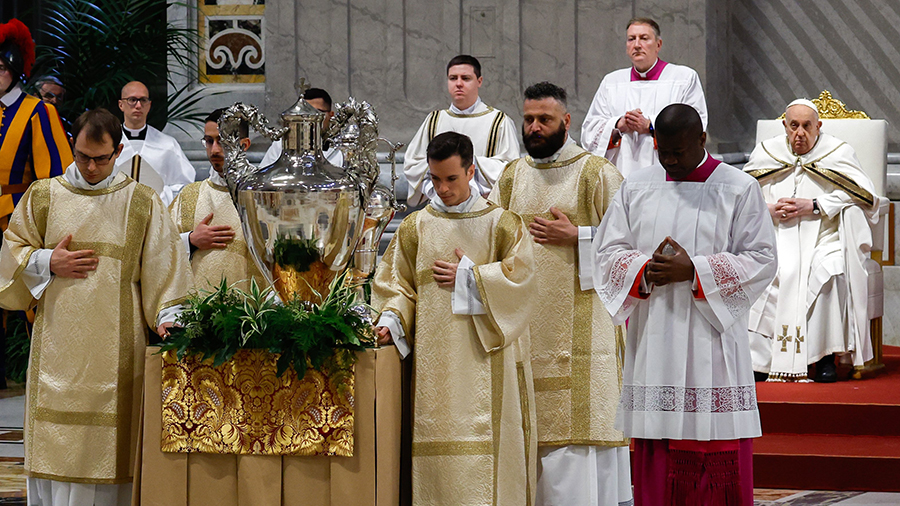
Pope Francis looks on as deacons carry the sacramental oils he blessed during the chrism Mass in St. Peter’s Basilica at the Vatican March 28, 2024. (CNS photo/Lola Gomez)
Cindy Wooden
Catholic News Service
VATICAN CITY — Just before some 1,500 priests, bishops and cardinals renewed their priestly promises, Pope Francis asked them to embrace “compunction,” which he said was “an aspect of the spiritual life that has been somewhat neglected yet remains essential.”
Looking at its etymology, he said that “compunction is ‘a piercing of the heart’ that is painful and evokes tears of repentance,” but it also is the only path to spiritual growth and to a merciful ministry to others.
Presiding over the chrism Mass March 28 in St. Peter’s Basilica, Pope Francis ended his lengthy homily by thanking the priests present and, by extension, those around the world.
“Thank you, dear priests, for your open and docile hearts. Thank you for all your hard work and your tears. Thank you, because you bring the miracle of God’s mercy to our brothers and sisters in today’s world,” he said. “May the Lord console you, strengthen you and reward you.”
Pope Francis preached for more than 20 minutes without apparent difficulty. While he presided over the chrism Mass, which is named after the olive oil mixed with balsam that is blessed during the liturgy, the principal concelebrant at the altar was Cardinal Angelo De Donatis, the pope’s vicar for Rome.
The Holy Week Mass was the first major liturgical celebration in the basilica since the towering baldachin over the main altar was wrapped in scaffolding for a 10-month restoration project funded by the Knights of Columbus.
Some 40 cardinals, 40 bishops and 1,500 priests concelebrated the liturgy.
After the homily, the clergy present renewed the promises made to their bishop at their ordinations and pledged to strive to be more united to Christ, “faithful stewards” of the sacraments and zealous pastors of souls.
Twelve deacons then wheeled large silver urns of oil down the center aisle of St. Peter’s Basilica for the pope’s blessing. The blessed oils will be distributed to Rome parishes and used for the sacraments of baptism, confirmation, ordination and the anointing of the sick in the coming year.
In his homily, Pope Francis said that compunction is “not a sense of guilt that makes us discouraged or obsessed with our unworthiness, but a beneficial ‘piercing’ that purifies and heals the heart” and often leads to the gift of tears, which are “the holiest waters after those of baptism.”
Christians who feel compunction, he said, “increasingly feel themselves brothers and sisters to all the sinners of the world, setting aside airs of superiority and harsh judgments” and are “filled with a burning desire to show love and make reparation.”
“Dear brother priests, from us, his shepherds, the Lord desires not harshness but love, and tears for those who have strayed,” the pope said. “How greatly we need to be set free from harshness and recrimination, selfishness and ambition, rigidity and frustration, in order to entrust ourselves completely to God and to find in him the calm that shields us from the storms raging all around us.”
In increasingly secular societies, Pope Francis said, priests and other church workers can be tempted to be “hyperactive” and yet feel completely inadequate.
“When that happens, we can become bitter and prickly,” he said. But “if bitterness and compunction are directed not to the world but to our own hearts, the Lord will not fail to visit us and raise us up.”
Compunction, Pope Francis said, should promote “a spirit of repentance,” but one motivated by love for the Lord and certain of the Lord’s love always.
“Let us rediscover our need to cultivate prayer that is not obligatory and functional, but freely chosen, tranquil and prolonged,” he told the priests. “Let us return to adoration and the prayer of the heart. Let us repeat: Jesus, Son of God, have mercy on me, a sinner. Let us sense God’s grandeur even as we contemplate our own sinfulness and open our hearts to the healing power of his gaze.”
